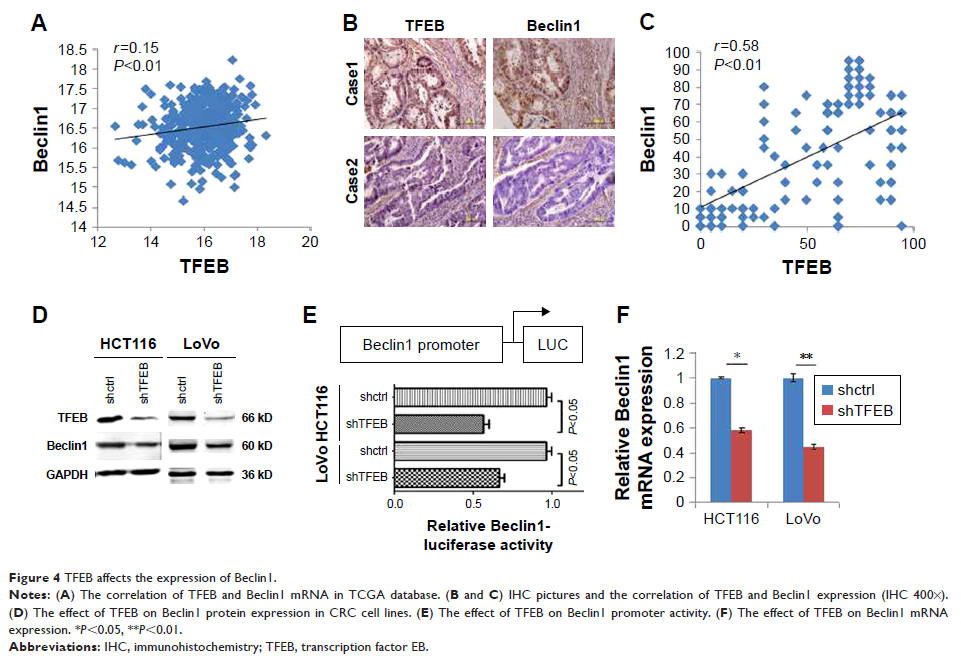9 0 8 1 0
论文已发表
注册即可获取德孚的最新动态
IF 收录期刊
- 2.6 Breast Cancer (Dove Med Press)
- 3.9 Clin Epidemiol
- 3.3 Cancer Manag Res
- 3.9 Infect Drug Resist
- 3.6 Clin Interv Aging
- 4.8 Drug Des Dev Ther
- 2.8 Int J Chronic Obstr
- 8.0 Int J Nanomed
- 2.3 Int J Women's Health
- 3.2 Neuropsych Dis Treat
- 4.0 OncoTargets Ther
- 2.2 Patient Prefer Adher
- 2.8 Ther Clin Risk Manag
- 2.7 J Pain Res
- 3.3 Diabet Metab Synd Ob
- 4.3 Psychol Res Behav Ma
- 3.4 Nat Sci Sleep
- 1.9 Pharmgenomics Pers Med
- 3.5 Risk Manag Healthc Policy
- 4.5 J Inflamm Res
- 2.3 Int J Gen Med
- 4.1 J Hepatocell Carcinoma
- 3.2 J Asthma Allergy
- 2.3 Clin Cosmet Investig Dermatol
- 3.3 J Multidiscip Healthc

TFEB 的高表达与结肠直肠癌的积极临床特点有关
Authors Liang J, Jia X, Wang K, Zhao N
Received 13 July 2018
Accepted for publication 10 October 2018
Published 13 November 2018 Volume 2018:11 Pages 8089—8098
DOI https://doi.org/10.2147/OTT.S180112
Checked for plagiarism Yes
Review by Single-blind
Peer reviewers approved by Dr Cristina Weinberg
Peer reviewer comments 5
Editor who approved publication: Dr William Cho
Objectives: The
transcription factor EB (TFEB), a member of the micropthalmia family, has been
found to be associated with autophagy and upregulated in some kinds of tumors.
However, very few studies focused on TFEB in colorectal cancer (CRC). TFEB
expression status and its relevance to clinical features in CRC would be
analyzed in this study.
Materials and methods: Real-time
PCR, Western blot, and immunohistological staining were used to evaluate TFEB
expression in CRC tissues and adjacent normal tissues, and the role of TFEB in
CRC cell lines was investigated in vitro and in vivo.
Results: TFEB was
expressed at lower level in CRC tissues than normal in both mRNA and protein
level. However, there were significantly positive correlations between TFEB
expression in cancer tissues and malignant progression of CRC. Cancers with
TFEB overexpression always had deeper infiltration and higher lymphatic
metastasis rate. Furthermore, patients with high TFEB levels always had poor
survival, and higher TFEB expression could be a predictor of survival in
multivariate analysis. Meanwhile, knockdown TFEB by shRNA or knockout TFEB by
sgRNA in CRC cell lines could significantly inhibit cell proliferation and
migration in amino acid-free medium. In addition, we found a positive
relationship between TFEB and Beclin1 expression, and silencing TFEB inhibited
Beclin1 expression in CRC cells.
Conclusion: TFEB
expression correlated with aggressive clinical features in CRC, and higher TFEB
expression could be a prognostic factor and potential treatment target of CRC.
Keywords: TFEB,
colorectal cancer, clinicopathologic variables, prognostic factor, Beclin1
